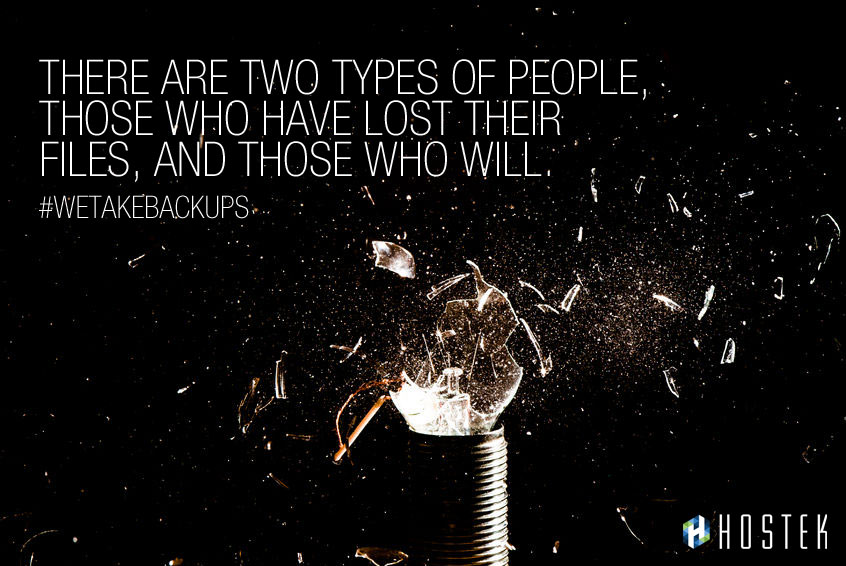Conversations about backups don’t come up often. Planning for backups is normally discussed at the beginning of a project, and during disaster – not too much in between.
[Tweet “There are two types of people, those who have lost their files, and those who will. #wetakebackups”]
Something my Visual Basic teacher in college said, reminding me to save a project to floppy – as a backup. A few days after not taking his advice I lost my homework.
Why Backups Matter
Loss may come in many different forms, here’s some of the likely reasons you can & will lose data:
- Deleted files
- Corrupted files
- Corrupted Operating System*
- Modified Files (such as being SQL injected)
*Remember – If your shared, dedicated or virtual private server hosting has crashed, you may not have the opportunity to get direct access to the original disks to get files off.
Replication Can Protect You Too (Advanced)
The only way to be sure a business can survive a hosting outage at their primary location, is have a second location. Most people believe this isn’t necessary – but we believe it’s good practice.
Here’s some of the most common, and best ways we see people replicating their data.
File Replication:
Keeping lots of files in sync takes a ton of CPU. The best overall method isn’t real-time, but instead a script that just copies/syncs everything periodically.
- Microsoft Server – For small sync or copy projects, a VPN and xcopy or robocopy seem to work most effectively. For those using Active Directory, DFS is an excellent choice for distributing files across multiple servers – you should have a hefty network connection if your files changed often.
- Linux – similarly a VPN and rsync work great.
Database Replication:
- SQL Server – it’s cost prohibitive for smaller businesses to utilize the Standard and Enterprise SQL products so we find it’s most effective to utilize Log Shipping with SQL Web. There’s some work involved in setting up, and making the failover server your primary, but for the protection it offers, it’s worth it.
- MongoDB & MySQL – The easiest form of replication is Master / Slave. That means that the master will handle the reading and writing and pass off change to the slave. In some cases you can utilize the slave for read operations.
We absolutely recommend replicating files and databases to another geographic location – for mission critical websites.
VPS & Web-hosting Backup Service
Some hosting providers do include backups as part of their Shared Hosting and Virtual Private Server Hosting. In my experience there’s a few different common options:
- Shared/cloud disk for backups (they provide storage, you backup what you want)
- Snapshots (snapshot whole server, no file based restores)
- Automated backups (full/file based restores)
There’s likely to be dozens of variations to the above common options.
At Hostek we believe backups are critical – so much so that we backup & replicate almost everything. Every VPS and Shared Hosting account is backed up. We use R1Soft to manage backups because it provides:
- Full server restores
- File based restores (single file, single database tables etc)
- Easy management
But we don’t stop there. All disks with the exception of special purpose disks are replicated to other hardware so we (and you) are protected from disk failures. And it means we can recover full server images, from snapshots in a hurry!
Your Protection Is Critical
Please don’t take backups lightly. In addition to your backups that your hosting provides, keep your files backed up locally, on your computer at your company. If you ever need them, you’ll confidently have them.
If you need help planning a strategic backup solution – in conjunction with a single or multiple hosting accounts or servers we’re here to help. Setup a zero hassle consultation for VPS accounts, or contact our sales team for more information on Shared Hosting.
Tags: Linux Shared Hosting, VPS Hosting, Windows Shared HostingCategories: Hosting



